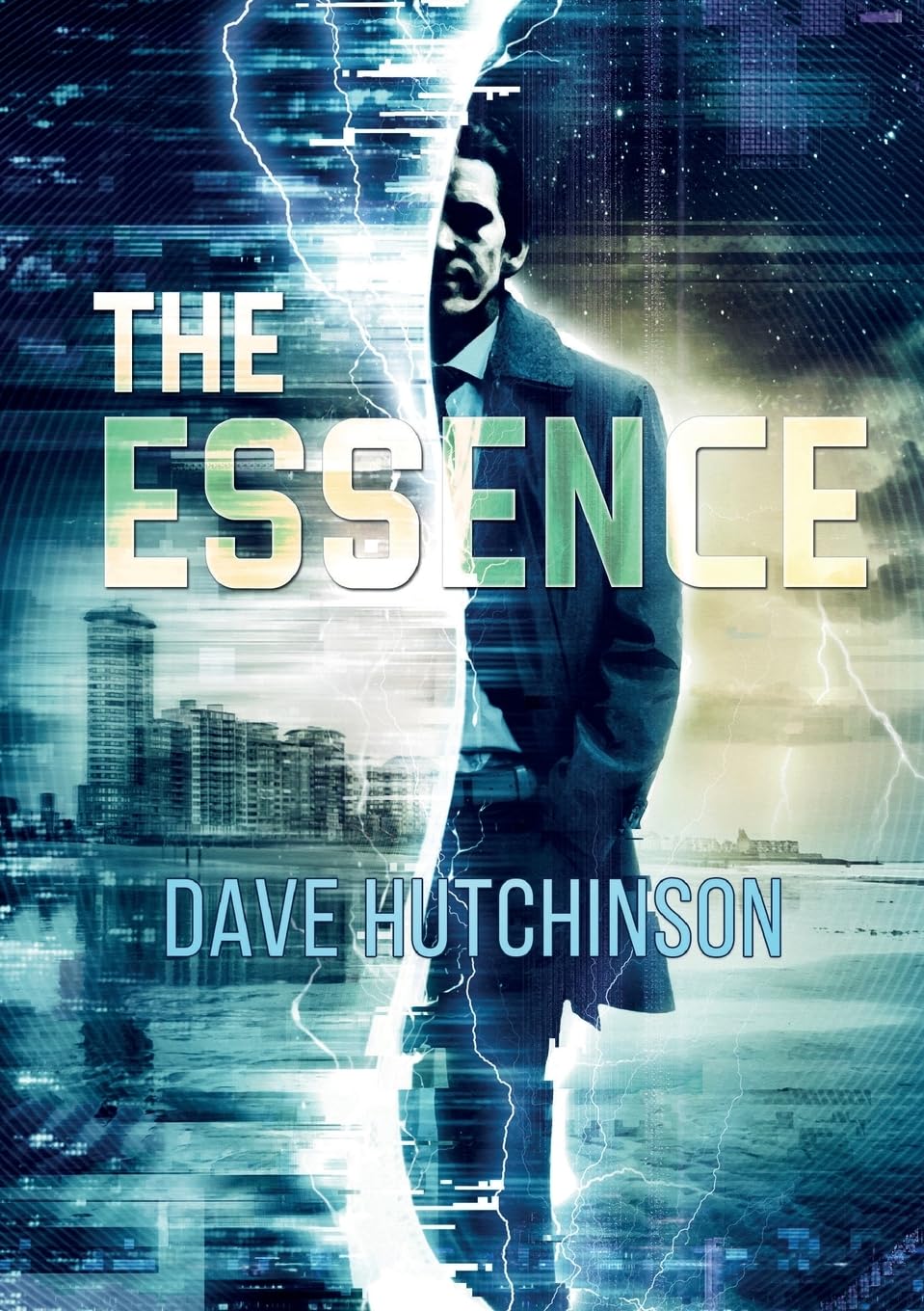Robert Charles Wilson
Robert Charles Wilson talks to... a dog
This interview was intended for French readers of my blog, but statistics indicate that it is of interest to the author's English-speaking fans. To avoid translation delays, here is the interview in its original version.
For the French version
Many thanks to Robert Charles Wilson
You are about to publish « The cure », can you tell some few words about it ? For example, do you know the american & french release date ?
 | |
| Facebook Robert Charles Wilson |
The Cure is a difficult book for me to describe. In part, it’s about a systematic brain modification, intended as a cure for schizophrenia, that becomes popular as a black-market neurological enhancement for otherwise healthy people. In the larger sense, it’s about what happens when we develop the ability to comprehensively engineer and alter not just our brains but the human genome. Who, if anyone, should be allowed to tamper with human inheritance? And what happens if those decisions are made in the shadows, without our consent or prior knowledge?
It took me an unusually long time to write The Cure, and I just handed in the finished manuscript, so there’s no official release date yet, either American or French. It’s not an immensely long book, but it’s in the range of my larger books—think Spin or Julian Comstock.
Last year, during an interview for the radiophonic show, La méthode scientifique, you said that Spin pushed you into the limits of your ambitions. A lot of the readers consider Spin like your best work ever, a book that will mark the science-fiction history. According to your facebook posts, it seems that your last book The Cure brang you into your last limits. Why do you think that ? Do you think that The cure will know the same notoriety than Spin?
I have no idea whether The Cure will have
the kind of success that Spin had. That’s not up to me. But yes, I did
feel that I was pushing my limits with The Cure. I’ve never written
this kind of multi-generational story before, I’ve seldom written from
the point of view of characters whose beliefs are so different from
mine, and it was particularly difficult to write a story set in the
relatively near future at a time when American, European, and global
politics are in a state of radical flux. When I started this book I
worried that real events would overtake anything I imagined. What I
learned to do was make a chaotic, unknowable future part of the
structure of the novel—to build that chaos into the book’s thematic
structure.
Many
of your novels contain extraterrestrial species and in your interviews,
it seems that you consider that there are extraterrestrials. In the
near futur, in your opinion, will we have a chance to detect traces of
intelligent lives?
My
best guess is that the chemistry of life is probably not uncommon in
the universe—here’s no reason to believe any chemical process is so
unique that it could only happen once, in a galaxy apparently stocked
with plenty of likely planets. But whether that translates into life
similar to ours, or whether sentient civilizations arise with any
regularity, I have no way of knowing. In English we say “it’s an open
question”—I’m sure there’s some equivalent French phrase. And that’s
what makes it interesting. We’re free to speculate, and speculation is
what science fiction is made of. It also raises the interesting
question of what happens to technological civilizations over very long
spans of time—hundreds of thousands or even millions of years—if such
civilizations are sustainable at all.
Religion is an item that we find regularly in your texts, why?
Religion interests me for a lot of reasons. It raises questions about what we believe and why—epistemological questions. It raises questions about the origin and nature of reality—cosmological and ontological questions. It raises questions about how we reconcile scientific discovery with moral and ecclesiastical traditions. All those questions are pertinent to science fiction, I think. Science fiction as a literature was born at a time when the Enlightenment was in a complicated discourse with traditional religion, and I’ve occasionally described science fiction as “miracle stories of the Enlightenment,” that is, stories that re-imagine traditional tales of gods, angels, strange lands, etc., within the constraints of a scientific understanding of the world.
Religion interests me for a lot of reasons. It raises questions about what we believe and why—epistemological questions. It raises questions about the origin and nature of reality—cosmological and ontological questions. It raises questions about how we reconcile scientific discovery with moral and ecclesiastical traditions. All those questions are pertinent to science fiction, I think. Science fiction as a literature was born at a time when the Enlightenment was in a complicated discourse with traditional religion, and I’ve occasionally described science fiction as “miracle stories of the Enlightenment,” that is, stories that re-imagine traditional tales of gods, angels, strange lands, etc., within the constraints of a scientific understanding of the world.

Your novel « A bridge of years » concentrates in my opinion a lot of your thoughts: the future, the progress, the weather, the climate, the future of the man and it is very marked by the humor, although tinged by a such darkness. It is also a "tribute" to Clifford D. Simak's novel Here Gather the Stars / Way Station, which I took pleasure in discovering. What do you think about this novel nearly 20 years later?
It’s been at least twenty years since I last read Way Station,
so I can’t speak to it directly. But I’ve always loved Clifford
Simak’s work for the way it puts a kind of mundane, dusty,
Midwestern-American reality next door to deep time and deep space. As
if to say: Everything shabby and ordinary has a hidden river of
strangeness running through it.
Many of your lyrics contain a lot of touch of humor, what do you think of an author like John Scalzi who has made its trademark, while having a critical background on our society ?
I love John Scalzi’s work, but I’m not sure I have anything profound to say about it.
Every
two years, you publish a novel, which is an eternity for a fan like me.
To make me wait, what do you think are the current authors who have a
writing and a way of approaching the subjects as you do, ie by
approaching them from a new angle ?
One contemporary writer who fascinates me is Ted Chiang. Deep strangeness, a unique approach, and a real knack for imaginatively literalizing peculiar (often religious) ontologies.
Another writer I keep returning to is Steven Millhauser. He’s not usually considered a genre writer, but his work (check out his novel Martin Dressler or his collection The Knife Thrower and Other Stories) often veers into explicit fantasy and is unforgettably strange.
I also have a copy of everything David Mitchell has written since Cloud Atlas.
One contemporary writer who fascinates me is Ted Chiang. Deep strangeness, a unique approach, and a real knack for imaginatively literalizing peculiar (often religious) ontologies.
Another writer I keep returning to is Steven Millhauser. He’s not usually considered a genre writer, but his work (check out his novel Martin Dressler or his collection The Knife Thrower and Other Stories) often veers into explicit fantasy and is unforgettably strange.
I also have a copy of everything David Mitchell has written since Cloud Atlas.
 |
| Wilson receives the Hall of Fame Canadian of the Science Fiction & Fantasy Association |
A little more lightness now, participants would have wanted you to answer a few questions :
What do you think of the cave trolls (the participant have a blog called Troll cave Country)?
I’m afraid I’m largely ignorant of cave trolls…though you could say I’m pro-troglodyte, generally speaking.
What do you think of the cave trolls (the participant have a blog called Troll cave Country)?
I’m afraid I’m largely ignorant of cave trolls…though you could say I’m pro-troglodyte, generally speaking.
What's your point of view on Fantasy ?
I
don’t read a lot of high fantasy. It’s not that I disapprove of it—I
still own the paperback copies of Tolkien I picked up in the late 1960s.
But it doesn’t tweak my sense of wonder quite the way science fiction
does.
You have never written directly on the space conquest (or at least indirectly as in Spin), is this a subject that could become the main object of one of your future novels ?
I don’t rule it out. In fact, I have a couple of half-formed ideas I may return to sooner or later….
I buy maple syrup maybe once or twice a year, almost as a patriotic duty—we’re all tree vampires here. Candidates for “national food” usually include Nanaimo bars, poutine, salmon jerky, butter tarts, and ketchup-flavored potato chips. I can’t honestly endorse any of these, though I’ve eaten all of them (thankfully, not all at one meal). It’s a wonder any of us live to adulthood.
The Cure now being sent to the publisher, other projects ?
Not really—I’m taking a sort of mini-vacation from the keyboard right now—but story ideas do keep crowding around and biting me on the ankle.
Do you pIan a travel to France ?
Not in the immediate future, though I’ve enjoyed all the time I’ve spent there.
Not really—I’m taking a sort of mini-vacation from the keyboard right now—but story ideas do keep crowding around and biting me on the ankle.
Do you pIan a travel to France ?
Not in the immediate future, though I’ve enjoyed all the time I’ve spent there.
To complete the interview, on his next novel The cure and religion, here is a post from his page Facebook
In THE CURE, the novel I just handed in, one of the major characters is a Christian. I’m an atheist, as many of you know, but I wanted to write the character plausibly and sympathetically, which meant stepping outside of my own convictions and trying to imagine Christian faith as a lived human experience rather than a philosophical debating point. Writing from that point of view made me a little more forgiving of the variety and depth of people’s metaphysical beliefs, and I hope the novel will have the same effect on readers.



































Toi aussi donne ton avis